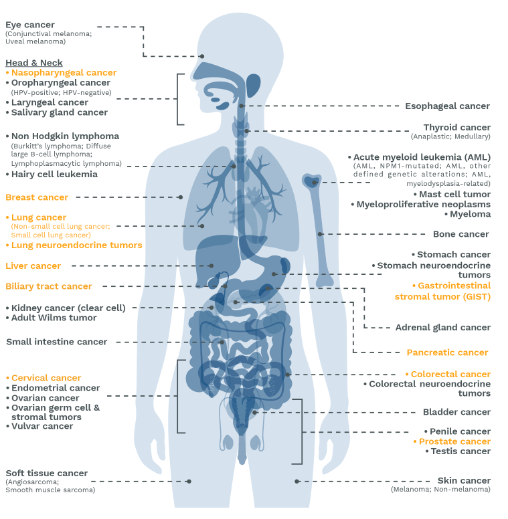

Cancer Screening
Don’t let cancer take away precious moments with your loved ones. Make the good times last with a cancer screening.
Your risk of developing cancer increases as you grow older. A cancer screening can help detect early signs of cancer before any symptoms appear.
Many cancers, such as lung cancer, breast cancer and colorectal cancer, respond better to treatment when detected early. If you wait till symptoms appear, the cancer may progress to an advanced stage and spread to other parts of the body, making treatment more difficult.
At Parkway Shenton, we offer cancer screening packages that are affordable and customisable to your needs. The types of screening tests you should get will depend on your age, gender, family history, and whether you have risk factors for specific cancers.
Speak to our doctors to recommend a suitable cancer screening package for you.
Recommended cancer screening
Regular screening is essential to detect cancer early. Some common cancers, such as lung cancer, are called “silent killers” because they can spread quickly without noticeable symptoms.
The good news is, early detection can significantly improve treatment outcomes and increase the chances of recovery.
If you are at higher risk of cancer due to family history or lifestyle risk factors (such as smoking), you should seek advice from your doctor and undergo screening more regularly.
If you are at average risk of cancer (meaning no symptoms or family history of cancer), you may consider these screening guidelines recommended by the Ministry of Health Singapore:
| Age | Screening for women | Screening for men |
|---|---|---|
| 18 - 24 |
|
|
| 25 - 39 |
|
|
| 40 - 49 |
|
|
| 50 - 64 |
|
|
| 65 years and above |
|
|
How to book a cancer screening
You can book a cancer screening test or package at any Parkway Shenton clinic or Executive Health Screening (EHS) clinic.
For enquiries, call our dedicated cancer care helpline at +65 6812 3396.
You may also download our MyHealth360 app to check clinic availability, book a screening package, and receive confirmation on your appointment.

Types of common cancer screening tests
Screening is especially effective in the prevention and early detection of cancers such as breast cancer, cervical cancer, colorectal cancer and lung cancer. Here are some common screening tests used to detect signs of specific cancers.
- Tumour markers blood test looks for specific cancer markers in your blood, which may indicate the presence of cancer.
- Liquid biopsy blood test detects cancer-associated alterations in DNA fragments circulating in the blood to pick up early cancers.
- Full blood count measures the levels of blood cells and platelets in your blood, which can help diagnose blood cancers such as leukaemia and lymphoma.
- Pap smear tests for cervical cancer and is recommended once every 3 years for women between ages 25 – 29.
- HPV DNA test checks for high-risk, potentially cancerous HPV strains in your cervical cells and is recommended once every 5 years for sexually active women (or had past sexual intercourse) above age 30.
- Mammogram is the most cost-effective screening test for breast cancer. It is recommended once every year for women between ages 40 – 49 and once every 2 years for women between the ages 50 – 69.
- Breast ultrasound uses sound waves to produce images of the breast and detect abnormalities, such as fluid-filled cysts, that are harder to diagnose on a mammogram.
- CT lung screen (LDCT) uses low doses of radiation to scan the lungs for signs of lung cancer.
- Occult Blood Immunological (OBI) looks for hidden blood in your stools, which may indicate colon cancer. Both men and women aged 50 and above should undergo this test once a year.
- Colonoscopy detects early signs of colon abnormalities and removes potentially cancerous polyps to prevent colorectal cancer.
- CT colonography is a minimally invasive test that uses X-rays to examine the inside of your colon and screen for colorectal cancer.
- Prostate ultrasound uses high-frequency sound waves to capture images of a man’s prostate gland, which can help diagnose urinary symptoms and detect signs of prostate cancer.
Cancer screening packages
$262 (with GST)
For clients who want to screen for common cancer conditions.
$558 (with GST) for men
$698 (with GST) for women
Detailed cancer screening with full suite of blood tests, tumour marker tests and gender-specific examinations.
$999 (with GST)
For clients seeking essential screening targeting 5 common early cancers through DNA fragments.
$1,329 (with GST) for women only
For female clients seeking tailored screening for common cancers affecting women's health through DNA fragments.
$1,999 (with GST)
For clients who are seeking assurance against common early cancers through DNA fragments.
$3,999 (with GST)
For clients who are seeking comprehensive assurance against 50 early cancers through DNA fragments.
$2,600 (with GST)
Assess your risk for heart attack, stroke and leukaemia with a simple blood test.
- Breast mammogram*
- Breast ultrasound*
- Cervical Pap smear (ThinPrep)
- Cervical Pap smear (ThinPrep) and HPV DNA test
- Chest low-dose CT scan*
- Chest X-ray*
- Screening colonoscopy*
Make the good times last and go for a lung health check today
Regular lung health screening is crucial in detecting lung cancer early, when it is most treatable
A lung health check is recommended if you meet one or more of the following criteria:
- You have a family history of lung cancer.
- You have a persistent cough, or are coughing up blood, losing excessive weight, or experiencing breathlessness.
- You are aged between 55 – 74, have smoked a pack of cigarettes per day for 30 years or more, and continue to smoke.
- You are aged between 55 – 74, have smoked a pack of cigarettes per day for 30 years or more, and have quit smoking.
- You are often exposed to second-hand smoke.

If you have a health screening enquiry, please email us or leave a message here. We will get back to you within 3 working days.
Make an enquiryIt is recommended in conjunction with existing screening tools (e.g. mammogram, colonoscopy) for
- Individuals aged 40 and above without personal history of cancer
- Individuals with elevated cancer risk such as family history of cancer
These are the 50 cancers covered in the Multi-Cancer Early Detection Screen 50:


Comprehensive cancer screening involves more specialised screening tests than basic cancer screening. You may need comprehensive cancer screening if you have symptoms that could be indicative of cancer, or if you are at increased risk for certain cancers due to family history, lifestyle habits or environmental exposure.
It is important to discuss with your doctor about your individual risk factors and whether comprehensive cancer screening is appropriate for you.
Certain screening tests, such as blood tests and ultrasound scans, may require you to fast for at least 8 – 10 hours prior to the test. You will usually be asked to abstain from food from 12am on the day of your appointment. Drinking plain water is permitted. Our clinic staff will advise you on whether fasting is required for your tests and when you should start fasting.
If you are taking the Occult Blood Immunological (OBI), please collect the kit from any of our Parkway Shenton or Executive Health Screening clinics. Collect your stool sample 1 day before your appointment, and store it at room temperature away from sunlight.
For females, kindly note that Pap smear, urine, blood tumour markers and stool tests should be done at least 5 days after your period to ensure better accuracy of results. Do inform our clinic staff if you require further assistance. If you are going for a mammogram, please do not wear any perfume, cream or cosmetics under your arms or around the chest area.
For more details, please refer to our pre-screening guidelines.
Our cancer screening packages will take approximately 1 – 3 hours to complete, depending on the types of screening tests required.
For blood tests, a blood sample will be taken from a vein in your arm. You may feel a slight sting as the needle is inserted or removed. This test usually takes less than 5 minutes.
Imaging tests such as ultrasound and CT scans will be done at one of our Executive Health Screening (EHS) clinics in a hospital. You may return for a follow-up appointment at your preferred Parkway Shenton or EHS clinic to review your test results with a doctor.
There is very little risk associated with blood tests. You may experience slight pain or bruising at the site where the needle was inserted, but these should resolve quickly within a few days.
Some imaging tests, such as mammograms and CT scans, may expose you to radiation from X-rays. However, the risk is low and does not outweigh the benefits of health screening.
There is no risk associated with urine or stool tests.
It may take around 1 – 2 weeks for the test results to be ready. Your doctor will review the results with you and advise on follow-up action, if necessary. You can also opt for online copies of the results or collect physical copies in person or via mail.
Raised tumour markers do not necessarily indicate the presence of cancer. Some benign conditions can also result in elevated levels of tumour markers. To confirm if cancer is present, you may need further investigations such as imaging tests or a biopsy. Please consult your doctor for more advice.
Cancer screening can be a powerful way to help detect cancer early, but it is not always accurate. It may falsely label a normal tissue as potentially cancerous (false positive) and cause a false alarm. Any abnormal findings may require further investigations or a referral to a specialist, and this may cause anxiety in people being diagnosed for cancer.
Sometimes, cancer screenings may also miss a cancer and not pick up all occult diseases (false negative).
If in doubt, speak with your doctor to understand the benefits and limitations of screening, and to determine the most appropriate screening tests for you.
The Multi-Cancer Early Detection Screen investigates alterations that are found in the genes. Genes are instructions for the cells to grow and function, and mutations to the genes sometimes cause the growth functions to go out of control, leading to cancer.
Cancer marker tests such as tumour marker blood tests look for the presence of proteins that are made in higher amounts by cancer cells.
Overall, gene mutations and protein markers have a “cause and effect” relationship regarding cancer detection. The Multi-Cancer Early Detection Screen should be used in addition to routine cancer screening tools offered by your doctor to bring clarity to early cancer screening.
The Basic LifeScreen is available at all Parkway Shenton clinics.
The Comprehension LifeScreen and Multi-Cancer Early Detection Screen are available at all Parkway Shenton Executive Health Screeners.


